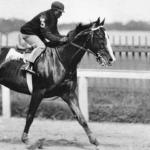
Cherokee Nation the Upset Pick in Robert B. Lewis Stakes

Want to get paid while surrounding yourself with Thoroughbred racing? Here are brief summaries of some careers in the industry.
Jockey
Jockeys are the most visible professionals in the Thoroughbred racing industry. Many aspiring jockeys begin by exercising horses in the mornings until they are experienced enough to compete.
More information about jockeys is available from the Jockeys’ Guild here.
Trainer
Trainers are responsible for every aspect of a racehorse’s care. They must know what to feed, how to bandage, what medications to use and when, how to pick a race, how to recognize when a horse is lame or ill and what to do about it and many other details.

Farm Manager
Farm managers are often responsible for mares and foals, stallions, horses in training, yearlings, weanlings and lay-ups. Good managers will also know a little about agriculture, construction, mechanics and wildlife.
Groom
Grooms are the extension of a trainer or manager and perform most of the tasks required to care for a horse, including grooming, feeding, watering, stall mucking, bandaging, tacking up and bathing.
Track Announcer
So you’d like to pursue a career as a track announcer? Here are tips from Tom Durkin, the longtime, now-retired voice of the New York Racing Association and the Breeders’ Cup, who is recognized as one of the top announcers in the sport's history.
Durkin started calling races full time in 1976 and estimated he has called “at least 50,000 races” in his career.

Tom’s Tips
Steward
Racing stewards are the highest officials at a racetrack and must be familiar with the rules of racing for their jurisdiction. Stewards’ authority includes supervision of racing officials, track management, licensed personnel and patrons to ensure compliance with the rules.